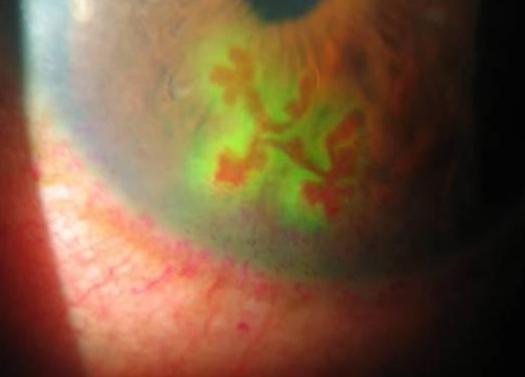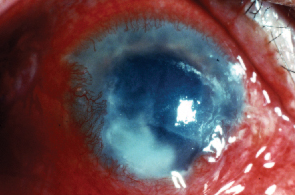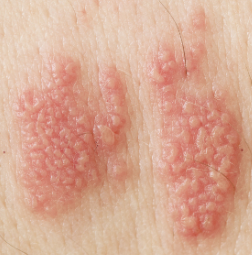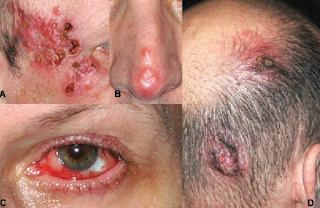We recently saw a young patient in her late 30’s who had blinding herpes in one eye that required multiple corneal transplants. She contracted herpes in college and it eventually destroyed her eye. She was a very pretty girl but after multiple failed corneal transplants and years of drops and frustration, she has given up on her left eye. Her eye used to look like this below, but now looks less red but still has scar tissue on the cornea with some residual eaten up sutures from the last failed corneal transplant. .
It was assumed initially the herpes was due to HSV1, which is oral herpes (the kind of herpes you can get from kissing someone with a cold sore). But a special test from a corneal sample showed the subtype of the virus was HSV 2, which is genital herpes.
Eye surgeons do not routinely test which herpes has cause the eye infection and subsequent corneal scar tissue and vision loss requiring a corneal transplant.
Surprisingly the CDC does not consider Herpes a reportable disease. Thus the statistics the CDC has on it’s website are misleading. It appears they have no idea what the true incidence or prevalence is.
Herpes Simplex can be devastating. Abbreviated HSV for Herpes Simplex Virus, there are 2 strains:
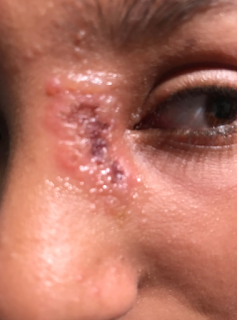
1. HSV 1 which usually occurs around the mouth (‘‘cold sores:’’a term many doctors really dislike as it makes is sound benign/not dangerous when the fact is that these simple “cold sores” can develop on the surface of the cornea and lead to blindness–though reversible ) and
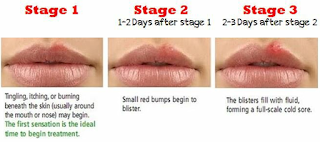
2. HSV 2 (see photos below) which is most often around the genitals: it is almost exclusively transmitted through sexual contact but there are published case reports, as well, of HSV 2 causing corneal scarring.
When people talk about genital herpes they mean it can be caused by type 1 and type 2 herpes simplex virus (HSV-1 and HSV-2). Both strains can destroy the cornea and eyeball but we have no data to tell us how often herpes (genital or oral version) affect the eye.
Both can cause corneas scarring and inflammation in the eye with potentially blinding results.
Herpes Simplex remains the #1 reason for needing a corneal transplant in the US.
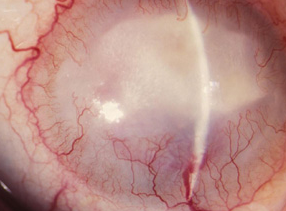
Corneal transplant surgery is the most common organ transplant done in the world. And even though our rates of success are excellent and the risks have decreased, it is still an organ transplant which means you will need to put in drops for the rest of your life or risk rejection and another round of surgeries and pain and vision loss.
Global prevalence of genital herpes is rapidly increasing with approximately 140 million people aged 15–49 years infected with genital HSV-1 infection and an estimated 417 million infected with HSV-2 internationally.
http://www.who.int/news-room/fact-sheets/detail/herpes-simplex-virus
We all need to warn young people to avoid sex before marriage. It is possible. It is possible to know your partner very well. It is possible to marry as a virgin. What a radical idea! But one that is possible and sight saving!
Recently a friend told me about a “Rainbow Party” which devastated her high school son it was so traumatic. I had never heard of it before and was shocked to think of how much herpes virus could be spread in such a horrific party.
I found this online about it:
Teachers and parents need to warn their sons and daughters about these horrific “virus spreading” parties and the peer pressure one can suffer to not participate.
I saved the gory photos of syphilis, another STD I have seen affect the eye recently in 2 young people in the form of chronic uveitis: also a potentially blinding disease.
SLC
NOTE: Herpes Zoster or Shingles is NOT just Sexually transmitted: it is from the VARICELLA virus that causes Chicken Pox (chicken pox is super contagious from sputum, The virus spreads mainly by touching or breathing in the virus particles that come from chickenpox blisters, and possibly through tiny droplets from infected people that get into the air after they breathe or talk, for example..
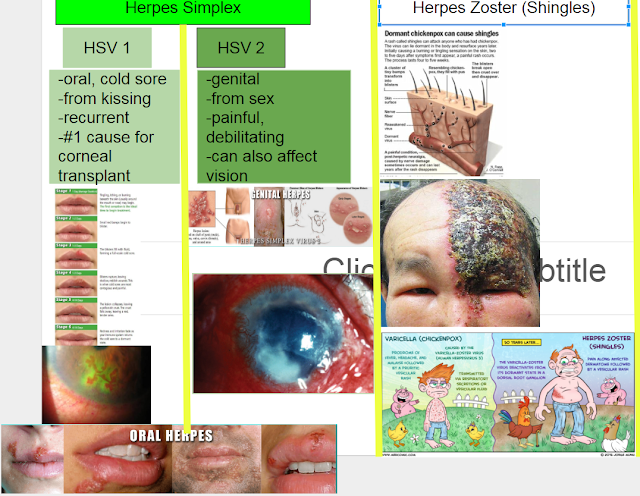
Photos of Syphilis:
One of the episodes on Netflix’s smash-hit CROWN has to do with the crown prince’s brother who has syphilis. At one point his doctor shows him photos of what can happen if he does have sex with another woman: at that time the did not have treatments for syphilis. Seeing such photos are disturbing and so far (I have not seen the whole series) he has chosen the wise path of abstinence.
Ocular Syphilis Presenting as Bilateral Acute Retinal Necrosis in an Immunocompetent Host.
Abstract
What are early symptoms of genital herpes?
- Fever and flu-like symptoms
- Burning or itching sensation in the genital area
- Pain during urination
- Feeling sick/nauseous
- Muscle aches and pains
- Blisters
What does herpes look like?
Genital herpes sores develop in several stages. When you notice the first symptoms such as tingling and itching you may not be able to see any sores. Over the course of the coming days, blisters will form. The blisters tend to be red at first and they soon fill with liquid and can take a yellow colour. Eventually, the blisters burst open and heal.
Can herpes cause just one sore?
Genital herpes outbreaks can differ in severity. While some people encounter multiple painful blisters, some only have one single sore. It is not uncommon for the symptoms to be so mild that they go unnoticed.
Where can you get herpes sores?
- penis
- scrotum
- groin and thighs
- buttocks
- around the anus
- labia
- inside the vagina
- groin, thighs
- on the buttocks and around the anus
How long does a herpes outbreak last?
- tingling or itching sensation in the affected area – this usually happens in the first 12 – 24 hours
- blisters form and fill with liquid
- blisters open and turn into sores
- ulcers turn into scabs and heal
How can I manage the symptoms?
- Keep the area clean to avoid infection. You can use water or salt water to wash the affected area.
- You can use an ice pack wrapped in a towel to reduce pain and soothe your skin.
- Drink plenty of fluids – this will dilute your urine and make passing urine less painful.
- Avoid tight clothing as it may irritate the blisters and sores further.
Herpes outbreaks – how often do the symptoms recur?
How can I prevent herpes outbreaks?
What are the symptoms of anal herpes?
Genital herpes sore can appear on your anus, especially if the virus is transmitted during anal sex. You may notice red bumps or blisters around your anus. Anal herpes can also cause pain, discharge and constipation.
Is herpes itchy?
During beginning stages of a herpes outbreak, you may experience a tingling, itching or burning sensation. As the episode progresses and blisters form the itching sensation tends to stop and the blisters tend to be painful rather than itchy.
I have herpes symptoms. Does that mean I can pass the virus on?
http://connect.jbiconnectplus.org/ViewSourceFile.aspx?0=19495
The below post by Dr. Vaughn, is a travesty! Could this be malpractice to even tell college students to relax about one of the most devastating STDs out there?
Herpes is a big deal. The anxiety college students could feel about “getting herpes” is nothing compared to the true anxiety, depression, and despair that occurs in students who contract herpes.
I am perplexed of why he would post this. Was this even challenged by anyone?
RELAX. IT’S JUST HERPES
- Talk to anyone you plan on getting nekked with! Even though itâs an awkward conversation to have at the beginning of a new relationship â or the end of a long night â itâs the best way to keep you and your partner safe.
- Use protection every time you have sex⦠yes, even with oral sex! For those keeping score at home, that means condoms or dental dams: [[[SLC note: again I think this is malpractice to tell students and patients that this is “safe” that is not true! I have seen patients who have used these “preventions” and get herpes! What can Dr. Vaughn say to such patients except, “Sorry. Maybe you did not use it correctly.” Doctors and surgeons need to tell patients the truth! These are no where near 100% safe so do not use the word “safe” do not even indicate it is an option as it does not sometimes and Herpes is a lifetime of pain of and on or oral pills or drops for life. Doctors should tell patients this. ]]]]]
Director, Student Health Services
Duke University
Vertical transmission of herpes simplex virus: an update.
Abstract
References:
http://klinikstd.com/herpes/
https://www.wehoville.com/2015/03/21/syphilis-eye-infections-are-reported-in-l-a-county/


